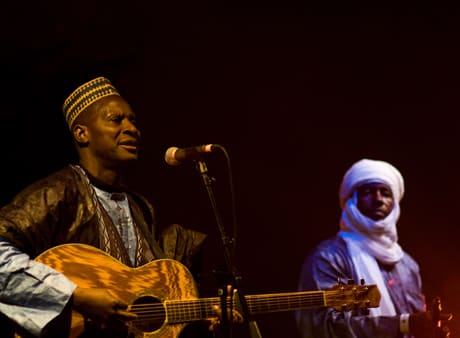Sidi Touré's second album for Thrill Jockey, Koima, has put him at the forefront of a new generation of African guitarists. His bright tone and fluid style is not unlike what Vieux Farka Touré is doing these days, but Sidi's tone may be the clearest coming out of West Africa. Perhaps he deviates from the typical nylon string guitar approach of the region? Or maybe he possesses particularly powerful fingering techniques? Whatever the reason, his lean quartet was full of attack amidst the lulling songs, and the crowd loved it.
A bit unusually, Touré had another acoustic guitarist on hand who was oftentimes playing in exact unison with him. It was an interesting effect, kind of like heavy metal where twin guitars go to war together. However, the guitarists had different tones. The supporting player boasted a more mellow, traditionally African sound that sounded more like a bass next to Touré's instrument.
Touré seemed relaxed in this comfortable surrounding where everyone spoke French. When he said he was going to tip his hat to the American bluesmen who had influenced him so, the crowd cheered heartily rather than puzzle over what he was saying, which seemed to give him greater confidence even when singing in Songhai.
In accompaniment were a calabash player who had a thing for double-time drum-and-bass rhythms, and the one string violin called a soukou alternately sounded like blues violinist Clarence "Gatemouth" Brown or a raunchy harmonica.
Throughout it all, a mother in the audience had her three-month-old baby in a sling, rocking backwards and forwards, eyes wide open but glassy, and totally slack jawed. Both mother and child were entranced by the music, and that feeling extended through the set.
A bit unusually, Touré had another acoustic guitarist on hand who was oftentimes playing in exact unison with him. It was an interesting effect, kind of like heavy metal where twin guitars go to war together. However, the guitarists had different tones. The supporting player boasted a more mellow, traditionally African sound that sounded more like a bass next to Touré's instrument.
Touré seemed relaxed in this comfortable surrounding where everyone spoke French. When he said he was going to tip his hat to the American bluesmen who had influenced him so, the crowd cheered heartily rather than puzzle over what he was saying, which seemed to give him greater confidence even when singing in Songhai.
In accompaniment were a calabash player who had a thing for double-time drum-and-bass rhythms, and the one string violin called a soukou alternately sounded like blues violinist Clarence "Gatemouth" Brown or a raunchy harmonica.
Throughout it all, a mother in the audience had her three-month-old baby in a sling, rocking backwards and forwards, eyes wide open but glassy, and totally slack jawed. Both mother and child were entranced by the music, and that feeling extended through the set.
